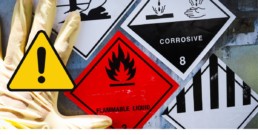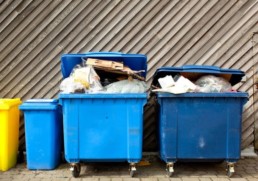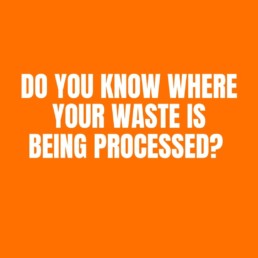The dangers of hazardous waste and how to do it safely
Introduction
Hazardous wastes are those which are dangerous and difficult to handle. If your business produces hazardous waste you have a duty of care to make sure it is disposed of properly.
Proper disposal of hazardous waste is crucial for the safety of people, animals, and the environment. Hazardous waste, if not handled correctly, can lead to severe health risks, contamination of soil and water, and dangerous chemical reactions. This document provides an in-depth understanding of the dangers associated with hazardous waste and offers guidelines on how to dispose of it safely.
The Dangers of Hazardous Waste
Hazardous waste encompasses many materials that pose significant risks due to their chemical composition, flammability, reactivity, or toxicity. Below are some of the primary dangers associated with hazardous waste:
Health Risks
- Exposure to Toxic Substances: Direct contact with hazardous waste can result in skin burns, respiratory problems, and poisoning. Many hazardous materials can be absorbed through the skin or inhaled, leading to serious health issues.
- Long-term Health Effects: Repeated exposure to certain hazardous materials, such as asbestos or heavy metals, can lead to chronic illnesses, including cancer, neurological disorders, and reproductive issues.
Environmental Impact
- Soil and Water Contamination: Hazardous waste can seep into the soil and groundwater, contaminating drinking water sources and agricultural land. This contamination can persist for years, affecting ecosystems and human health.
- Air Pollution: Improper disposal methods, such as incineration without appropriate controls, can release toxic fumes and particles into the air, contributing to air pollution and respiratory ailments.
Fire and Explosion Hazards
- Flammable Materials: Certain hazardous wastes, such as solvents and chemicals, are highly flammable and can easily ignite, causing fires and explosions that put lives and property at risk.
- Reactive Substances: Some hazardous materials can react violently with other substances, leading to dangerous situations that can result in explosions or release toxic gases.
How to Dispose of Hazardous Waste Safely
Safe disposal of hazardous waste requires adherence to specific regulations and best practices. Below are the key steps to ensure the safe handling and disposal of hazardous materials in commercial settings:
Identify Hazardous Waste
Properly identifying hazardous waste is the first step in ensuring its safe disposal. This involves:
- Labeling and Segregation: Label all hazardous materials and segregate them from non-hazardous waste. This helps prevent accidental mixing and ensures that each type of waste is handled appropriately.
- Understand hazardous materials, their properties, risks, and safe handling procedures.
- Further guidance for workplace health and safety can be found at The Health and Safety Executive (HSE).
Use of Appropriate Containers
The containers used for storing and transporting hazardous waste must be suitable for the specific type of waste, following all relevant regulations for proper storage and disposal. Key considerations include:
- Durability: Use durable containers that are resistant to the chemicals they will hold. This prevents leaks and spills.
- Sealing: Ensure containers are properly sealed and labelled to prevent the release of hazardous substances.
Compliance with Regulations
Adherence to regulations is essential for the safe disposal of hazardous waste:
- These regulations apply to those who produce, broker/deal, carry and receive hazardous waste to keep, treat or dispose of. Hazardous waste must be accompanied by correctly completed paperwork called a consignment note, or hazardous waste consignment note (HWCN). The note must be prepared before any hazardous waste is moved and is required for all movements of hazardous waste.
- Record-Keeping: Maintain accurate records of the types and quantities of hazardous waste generated, as well as the disposal methods used. These ensure the traceability of the waste from origin to disposal.
Training and Education
Educating employees about the dangers of hazardous waste and proper disposal methods is crucial for maintaining a safe work environment. Training programs should cover:
- Hazard Identification: Teach employees how to identify hazardous materials and understand their risks.
- Emergency Procedures: Train employees on emergency procedures in case of spills, leaks, or exposure to hazardous substances.
Working with Footprint Recycling
Working with a professional waste management company will ensure that hazardous waste is disposed of safely and in compliance with regulations. We have the expertise to handle hazardous waste safely and will ensure you have the right equipment for safely transporting, treating, and disposing of hazardous materials.
All businesses have a responsibility to dispose of hazardous waste safely. By understanding the dangers of hazardous waste and following best practices for its disposal, businesses can protect their employees, the public, and the environment. Proper identification, appropriate containers, regulatory compliance, professional waste management services, and employee training are all essential components of a comprehensive hazardous waste management strategy.
Call us on 01484 660770 or email our team if you'd like to find out more.
INTRODUCING THE NEW 2025 MANDATORY WASTE LEGISLATION IN ENGLAND
In October 2023, the UK Government introduced new Simpler Recycling legislation as part of the Environment Act 2021 to improve waste collection and recycling in England.
The new legislation aims to clarify what materials can be recycled, standardise recycling practices at home, work, and school, reduce landfill waste, tackle illegal waste disposal, and increase recycling rates.
As part of the Simpler Recycling legislation, delivery timelines have been set:
- 31 March 2025 - Non-households
Businesses (more than ten employees) need to separate dry recyclables and food waste. - 31 March 2026 - Households
Local authorities must collect all dry recyclable materials and separate weekly food waste collections (which can be combined with garden waste) - 31st March 2027 - Households and non-households
Inclusion of plastic film packaging and plastic bags in the plastic waste stream - 31st March 2027 - Micro-businesses
Businesses with fewer than ten employees must recycle all specified waste streams.
From the end of March 2025
Businesses with ten or more employees must separate dry recyclables into specific containers and arrange food collection separately.
What does this mean for your business?
All mixed recycling, including cardboard, plastics, glass, and metal, should be carefully separated and disposed of in accordance with the new guidelines to ensure that each material is recycled appropriately and to minimise environmental impact.
If a business produces more than 5kg of food waste per week, it must arrange a separate collection by licensed waste carriers. This includes biodegradable materials from processing or preparing food, such as inedible parts like bones, eggshells, fruit and vegetable skins, tea bags, and coffee grounds. The new legislation excludes micro-businesses (businesses with fewer than ten full-time equivalent employees).
According to the official government response, food waste collected must undergo anaerobic digestion treatment. This process generates biofuel, which can be used for energy, while digestate is a nutrient-rich substance produced by anaerobic digestion that can be used as a fertiliser, helping to form a circular economy.
To comply with the new legislation, your business must implement the new waste requirements, including storage and collection processes, by 31 March 2025. Businesses that fail to comply with the new regulations will face fines, enforcement actions, and potentially prosecution.
Compliance ensures that your business will avoid financial penalties, demonstrate corporate responsibility, and improve sustainability credentials. It’s also an opportunity to review your services and save costs.
How can Footprint Recycling help?
- Footprint Recycling will conduct a thorough waste audit, evaluating your current processes, staff awareness, equipment, sustainability, waste streams, volumes, service frequency, bin types, and costs.
- We will ensure compliance with new regulations and identify the best solutions for your business. We will help establish suitable systems to maintain compliance and prevent business disruptions.
- Our team will provide training to ensure employees understand the importance of new practices and know how to separate food waste correctly.
- We will provide food waste collection services and arrange appropriate collection schedules.
- We can assist you in achieving significant cost savings by reducing general waste volume and the associated costs of waste removal and recycling.
- We will generate reports that showcase your sustainability efforts, demonstrating your dedication to reducing environmental impact.
- We will support your efforts to comply with regulations, enhance your company’s brand reputation, particularly among environmentally conscious consumers and investors, and explore partnerships with local charities to donate surplus food.
By embracing these innovations, businesses can comply with regulations and turn food waste management into a competitive advantage.
Get in touch to discuss your requirements.
Responding to the needs of our customers
We recently had a conversation with one of our customers and gained valuable insights about the benefits of working with Footprint Recycling. It was such an inspiring story we shared it across our channels and we received a comment about the importance of reviewing where the waste was being processed and ensuring it was being processed effectively. This is absolutely right.
All businesses need to consider where their waste is processed as part of their waste journey as when it comes to reducing waste and promoting sustainability, businesses have a significant role to play.
At Footprint, we believe that a comprehensive waste journey analysis is the first step towards achieving this goal. We work closely with our customers to assess their waste production and identify areas where they can reduce, recycle, reuse, and repurpose waste.
We then assist them in implementing these changes while ensuring that they comply with all legal requirements. We understand that monitoring and reporting are critical components of any waste management process. That's why we provide our customers with regular updates on their waste journey process, including data on waste generation, recycling rates, disposal methods and outcomes. This information helps them to evaluate their progress and identify areas for further improvement.
We believe that a zero-waste approach is the way forward, and we encourage our customers to adopt this mindset. By eliminating waste from their production processes and finding innovative ways to repurpose and reuse materials, businesses can significantly reduce their environmental impact while saving money.
In conclusion, our comprehensive waste reduction process is designed to guide businesses towards sustainability and zero-waste practices. We believe that by working together, we can make a real difference and build a better future for generations to come.
World Oceans Day 2023
Today is World Oceans Day, a day to reflect on the ocean's vital role. The ocean is home to countless plants and animals, from tiny single-celled organisms to the majestic blue whale.
Marine plants provide us with approximately 50-70% of the oxygen we breathe, while the ocean also 30% of the carbon dioxide produced by humans, helping to mitigate the effects of global warming.
The ocean also plays a crucial role in regulating our climate, providing warmth in the winter and cool breezes in the summer. Additionally, it provides us with food, medicines, and transportation. However, there are pressing issues that threaten the health of our oceans. Plastic pollution, particularly single-use items like bags and bottles, is a significant concern that has been the focus of World Oceans Day campaigns for several years.
Climate change and rising sea temperatures are also serious problems, as they directly affect weather patterns and put marine organisms at risk. The increasing acidity of seawater due to rising carbon dioxide levels is yet another challenge we must address. Let us take this day to reflect on the importance of our oceans and commit to protecting them.
As a business, how can we take a stand and support our oceans' ecosystem? If you know of any pioneering businesses in this area, please comment below! We'd love to hear about them.




